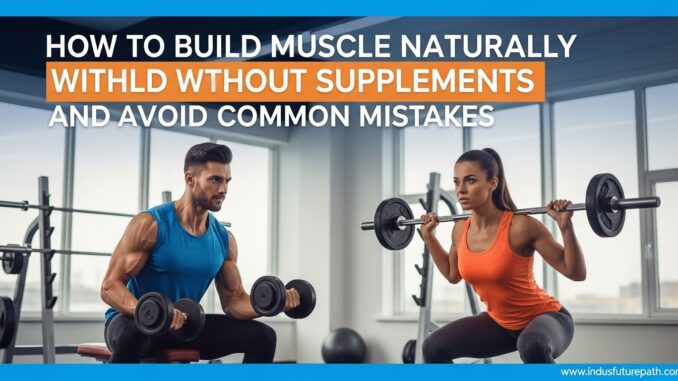
When I first stepped into a gym years ago, I was overwhelmed. Rows of shiny tubs of protein powder lined the walls, posters advertised “miracle” pre-workout drinks, and everyone seemed to be talking about the latest supplement stack. For a beginner, it felt like if I didn’t spend half my paycheck on powders and pills, I wouldn’t get anywhere. Maybe you’ve felt the same way — like supplements are the secret door to muscle growth that you can’t afford to miss. But here’s the truth: building muscle doesn’t require anything that comes in a flashy container. People were sculpting strong, muscular bodies long before the supplement industry even existed.
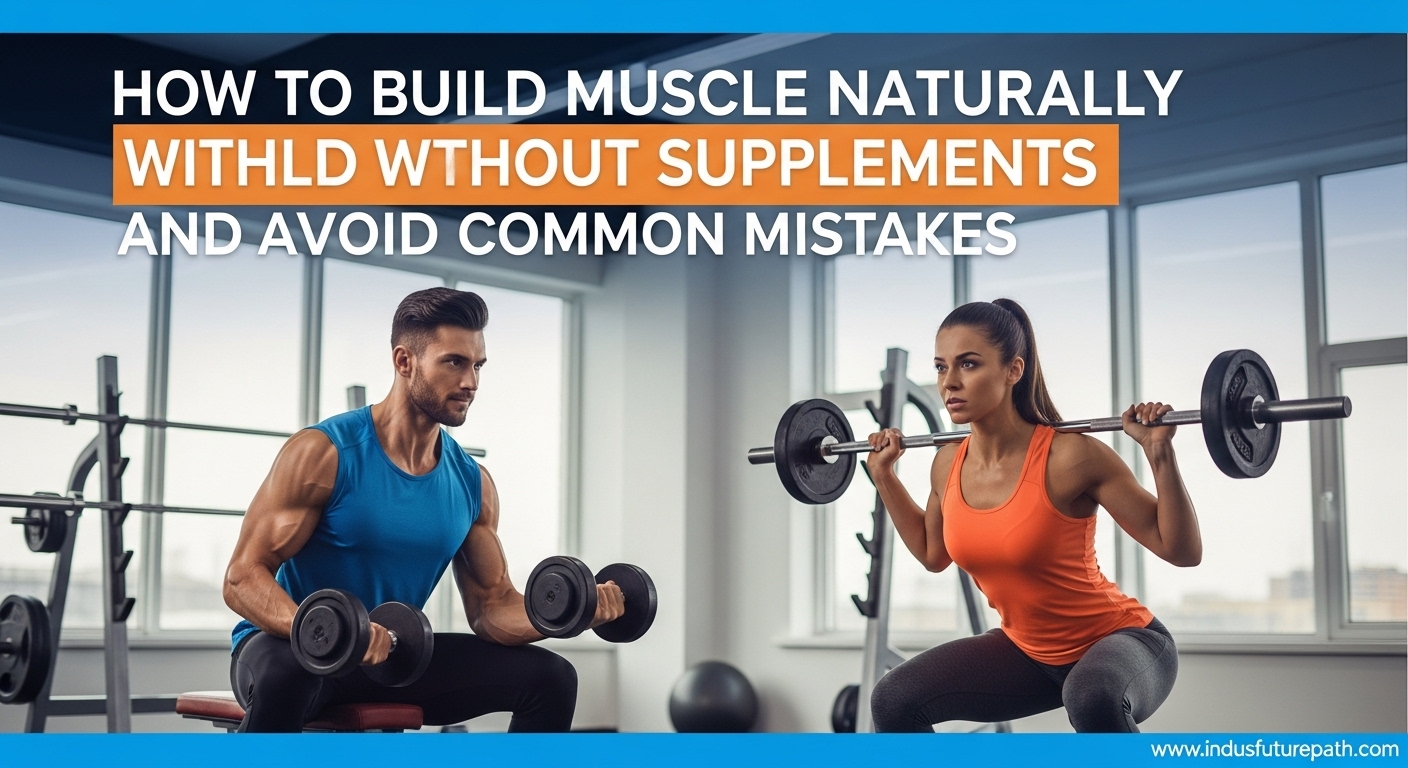
Think about it for a moment. Ancient warriors, laborers, athletes of the early twentieth century — they didn’t have whey protein shakes waiting for them after battle or creatine capsules stashed in their gym bags. They built muscle the old-fashioned way: with real food, consistent training, hard work, and recovery. Supplements can be convenient, sure, but they’re not magic. If you strip everything down to the basics, your body needs only a few things to grow: the right stimulus (exercise), the right fuel (nutrition), and enough rest to repair and adapt. That’s it. And that’s exactly what we’re going to break down in this article.
Understanding How Muscles Actually Grow
Most beginners think muscles grow inside the gym. You lift weights, you sweat, and boom — your biceps get bigger, right? Not quite. The workout itself is only the trigger. What’s happening in your body is called hypertrophy. Every time you challenge your muscles with resistance — whether that’s lifting a barbell, doing push-ups, or carrying heavy groceries — you create tiny microtears in the muscle fibers. Don’t worry, this is a good thing. Your body responds by repairing those fibers, and when it does, it makes them a little thicker and stronger than before.
Here’s the catch: that growth doesn’t happen during the workout. It happens afterwards, when you’re resting and giving your body the nutrients it needs to rebuild. This is why sleep, diet, and recovery days are just as important as your gym sessions. If you keep stressing the muscle without letting it recover, you’re like a builder demolishing walls without giving the crew bricks to rebuild. Nothing improves, and eventually the structure breaks down.
I remember when I first started lifting, I was hitting the gym six days a week, sometimes even twice a day, because I thought more was better. My body disagreed. I felt constantly sore, my progress stalled, and I couldn’t figure out why. It wasn’t until I backed off, trained smarter, and prioritized recovery that my muscles actually started to grow.
Nutrition: Real Food Beats Powders Every Time
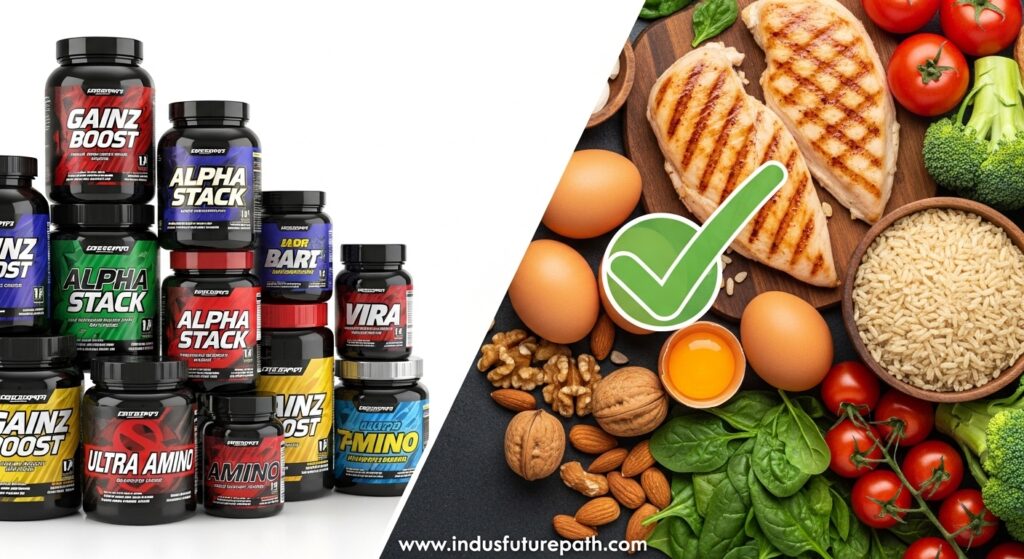
This is the part where most people get tripped up. Walk into any gym, and you’ll see people mixing protein shakes as if they’re potions. Don’t get me wrong — protein is essential for muscle growth, but shakes are just a shortcut. You can absolutely get everything you need from whole foods. In fact, real food often provides additional nutrients that powders simply don’t.
Protein is the star of the show, since it supplies the amino acids your body uses to repair and build muscle fibers. A good rule of thumb is to eat between 1.6 and 2 grams of protein per kilogram of your body weight. That sounds complicated, but here’s what it looks like in real life: if you weigh seventy kilos, you’re aiming for around 120–140 grams of protein each day. That’s entirely possible with regular meals. Eggs for breakfast, chicken or lentils at lunch, fish or beef at dinner, plus snacks like yogurt, nuts, or chickpeas can get you there without a single scoop of powder.
Carbohydrates are often misunderstood. Many people think they should cut carbs to “stay lean,” but if your goal is to build muscle, carbs are your best friend. They fuel your workouts and help your body recover afterward. Without them, you’ll feel drained and sluggish, and good luck pushing through a heavy squat session on an empty fuel tank. Complex carbs like oats, brown rice, sweet potatoes, and whole wheat bread are excellent staples.
Then there are fats, which people often avoid because they fear gaining weight. But healthy fats are crucial for hormone production, especially testosterone, which plays a huge role in muscle growth. Foods like avocados, olive oil, nuts, and salmon aren’t just tasty — they keep your body in balance and support recovery.
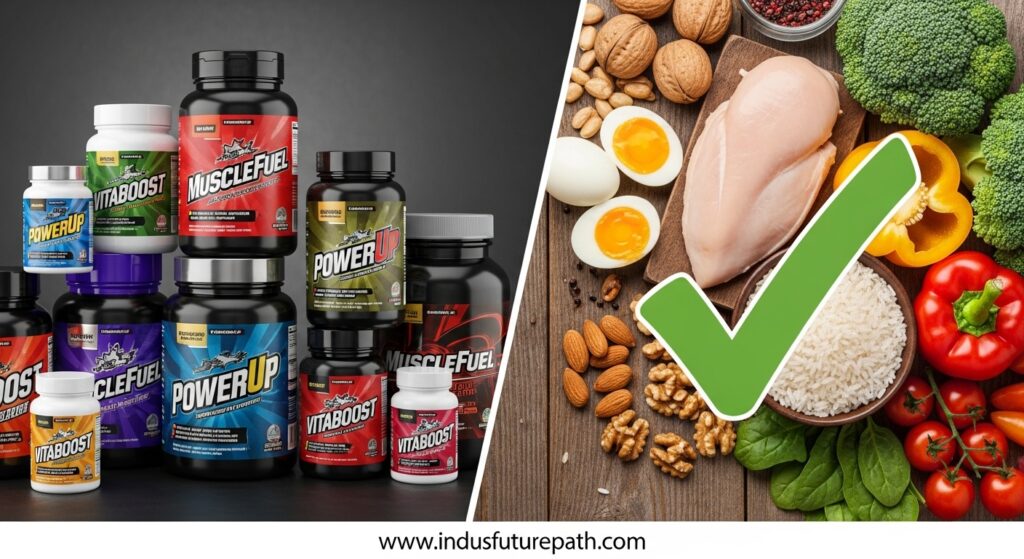
One mistake I made early on was thinking meal timing didn’t matter. I’d sometimes go half a day without eating properly, then stuff myself at night and wonder why my workouts felt awful. Muscles need a steady stream of nutrients throughout the day. Eating protein at every meal helps, and timing carbs before and after your workout can make a noticeable difference in energy and recovery. For example, a bowl of oats with fruit before training gives me lasting energy, while a hearty meal of chicken and rice afterward helps me bounce back faster. Even a glass of milk before bed can supply slow-digesting protein to keep my body fueled while I sleep.
Training Smart, Not Just Hard
Here’s where a lot of people either overcomplicate things or chase shortcuts. Building muscle naturally doesn’t require fancy machines or exotic workout programs. The foundation lies in resistance training and something called progressive overload. In simple terms, this means doing a little more over time — lifting slightly heavier weights, squeezing out extra reps, or improving your form and intensity. That constant challenge forces your muscles to adapt and grow.
If you’re new to lifting, focus on compound exercises — the ones that hit multiple muscle groups at once. Squats, deadlifts, bench presses, pull-ups, and overhead presses are classics for a reason. They let you lift heavier loads and trigger growth across the whole body. When I switched from endless curls and pushdowns to these big lifts, my progress skyrocketed. It wasn’t glamorous, but it worked.
As for how to structure workouts, there’s no single perfect answer. Beginners often do well with full-body sessions three times a week. That way, every muscle group gets worked regularly, and you don’t burn out. As you advance, you might move to splits like push-pull-legs or upper-lower routines. What matters most is consistency. Don’t jump from program to program chasing novelty. Stick to one plan, track your progress, and focus on getting stronger week after week.
Another key detail is rep ranges. Heavy, low-rep training builds strength, while moderate reps in the 8–12 range are ideal for muscle growth. Higher reps with lighter weights build endurance. Most natural lifters find the sweet spot in that middle zone, pushing enough weight to challenge the muscle but still keeping good form. And yes, form matters. Don’t be the person jerking a barbell around to impress the mirror. Proper technique not only prevents injuries but also ensures the muscle you’re targeting is actually doing the work.
The Power of Recovery
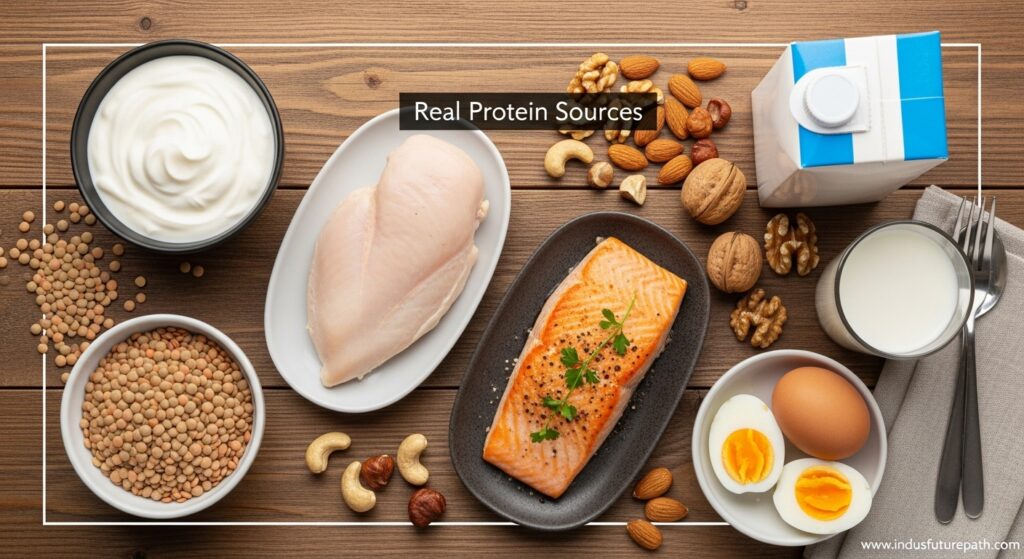
Now here’s the part many people ignore: growth happens when you rest. Think of recovery as the other half of training. Without it, all your effort in the gym is wasted. Your muscles need time to repair those microtears, and they can’t do that if you’re hammering them every day.
Sleep is the ultimate recovery tool. During deep sleep, your body releases growth hormone, repairs tissues, and restores energy. If you’re serious about building muscle, aim for at least seven to nine hours of sleep every night. When I finally fixed my sleep schedule, it felt like I was unlocking hidden progress. Suddenly, my lifts improved, I had more energy, and my muscles looked fuller.
Stress management is another underrated factor. When you’re stressed, your body produces cortisol, a hormone that actually breaks down muscle. Think about those weeks when life feels overwhelming — workouts feel harder, recovery takes longer, and motivation drops. Managing stress through meditation, walks, or even just unplugging from screens can make a real difference in your gains.
And let’s not forget active recovery. Rest days don’t have to mean sitting on the couch all day. Light activity like stretching, yoga, or a brisk walk keeps blood flowing and helps reduce stiffness. I’ve found that when I move a little on my off days, I come back stronger and fresher for the next workout.
Lifestyle Choices That Matter

Outside the gym and kitchen, the little things you do every day add up. Hydration, for example, is often overlooked. Muscles are mostly water, and dehydration can tank your performance faster than you think. Carrying a water bottle and sipping throughout the day sounds simple, but it’s a game-changer.
Habits like smoking and heavy drinking? They’re enemies of muscle growth. Alcohol disrupts recovery, lowers testosterone, and adds empty calories that don’t fuel your body. Smoking reduces oxygen supply, which directly impacts performance and endurance. If you’re serious about building muscle naturally, cutting back — or better yet, quitting — will only help.
And above all, consistency is king. You won’t see overnight changes, and that’s okay. Natural muscle growth is a slow process, but it’s also sustainable. The guys you see chasing shortcuts with dangerous substances often end up with health issues or burned-out bodies. The slow-and-steady path may test your patience, but it builds results that last.
Avoiding Common Pitfalls

I’ve made plenty of mistakes along the way, and maybe you have too. One of the biggest is chasing instant results. Muscle growth takes time — months and years, not days. Don’t compare your first year of training to someone else’s tenth. Focus on your own journey.
Another trap is spending all your time on isolation exercises like curls and tricep extensions while ignoring the big lifts. Sure, curls can give you a pump, but they won’t transform your physique alone. Compound movements build the foundation; isolation work is just the polish.
And please, learn proper form early. I can’t tell you how many times I’ve seen someone throw their back out trying to ego-lift a deadlift or bench with sloppy technique. Injuries set you back more than any skipped workout ever will.
Skipping meals or undereating is another silent progress killer. If you’re not giving your body enough calories, it won’t have the resources to grow. Remember, building muscle is a surplus game: you need to eat slightly more than you burn. Track your meals for a while if you’re unsure, and adjust as needed.
What a Day of Natural Eating Looks Like
To give you a clearer picture, here’s what a typical muscle-building day might look like without supplements. Imagine waking up to a breakfast of scrambled eggs with whole-grain toast and a glass of milk. Mid-morning, you grab a banana and some almonds for quick energy. At lunch, you enjoy a plate of grilled chicken, rice, and fresh vegetables. In the afternoon, before your workout, you fuel up with a bowl of oats mixed with yogurt and berries. After training, you sit down to a hearty dinner of salmon, sweet potatoes, and broccoli. Later in the evening, you snack on cottage cheese before bed, giving your muscles slow-digesting protein through the night.
Every meal is made from real, simple ingredients, yet together they provide all the protein, carbs, fats, and micronutrients you need to grow. No powders. No fancy shakes. Just food your body recognizes and knows how to use.
The Truth About Supplements
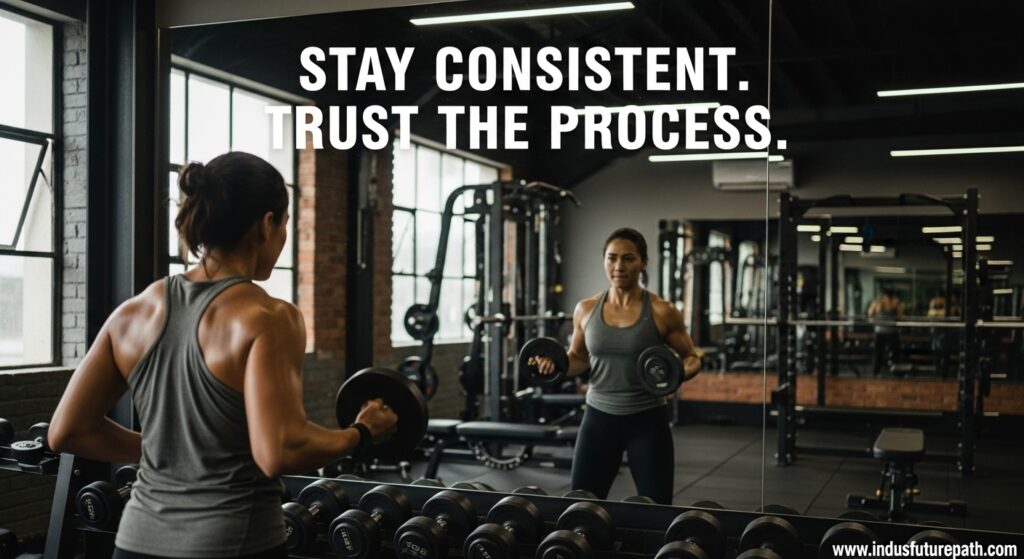
Now, let’s address the elephant in the room. Do supplements work? Some do, to an extent. Whey protein is convenient if you’re struggling to hit your protein goals, creatine has proven benefits, and caffeine can boost workout performance. But none of these are required. They’re like seat warmers in a car — nice to have, but the car still drives perfectly without them. The problem is that the industry markets them as essential, making beginners believe they can’t grow without spending big money. That’s simply not true.
I trained for years before I ever touched a protein powder, and I made great progress just by eating real meals. In fact, focusing on food forced me to learn more about nutrition and cooking, which became a life skill I value far more than any supplement. If you see supplements as a shortcut, you’ll always feel like you’re missing something. But if you see them as optional tools, you’ll never be dependent on them.
Staying Motivated on the Natural Path
The hardest part about building muscle naturally isn’t the training or even the diet — it’s staying patient. Progress comes slowly, and sometimes it feels invisible. That’s where motivation and perspective matter. Set small, realistic goals, like adding two kilograms to your squat every couple of weeks or aiming to gain one kilogram of muscle over two months. Track your progress, take photos, and celebrate the little wins.
I still remember the first time I benched my own bodyweight. It wasn’t some dramatic transformation, but it was proof that consistency pays off. Those moments keep you going when progress feels slow. Training with a friend can also make a huge difference. You push each other, keep each other accountable, and share the journey.
Final Thoughts
At the end of the day, building muscle naturally without supplements is not only possible — it’s the healthiest and most sustainable way to do it. Focus on fueling your body with real food, training with purpose, sleeping like your gains depend on it (because they do), and managing your lifestyle in a way that supports growth. The journey won’t be quick, but it will be worth it.
Supplements might promise shortcuts, but natural gains build more than muscle. They build discipline, patience, resilience, and confidence. And those qualities don’t fade when the tub runs out — they stay with you for life.
So the next time you’re tempted to believe you need that magic powder to grow, remember this: your body already has everything it needs. All it asks from you is consistency, effort, and a little patience. Stick to the basics, trust the process, and watch yourself grow — stronger, healthier, and naturally.

Leave a Reply